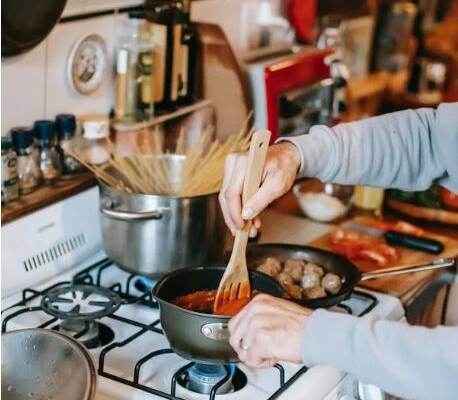Cooking with Sarah Boorer
Luke Grant is joined by Sarah Boorer, Communications professional & CWA award-winning cook, to look at the world of baked goods, delicious treats and & easy recipes.
This week Sarah whips up Sticky Toffee Pudding (recipe courtesy of Flour and Stone).
DATE MIXTURE
250g fresh dates, pitted
250ml water
1 teaspoon bicarbonate of soda
1 teaspoon instant espresso granules
PUDDING MIXTURE
150g unsalted butter, softened
250g dark brown sugar
3 eggs
180g self-raising flour, sifted
CARAMEL SAUCE
250g caster sugar
100ml water
250ml pure cream
1 DATE MIXTURE
Place the dates and water into a large saucepan over medium heat. Bring to the boil, then reduce the heat and simmer for 5 minutes or until the dates are soft. Remove the pan from the heat and add the bicarbonate of soda, stirring it through well with a wooden spoon to combine. The mixture will become molten for a moment but don’t worry – just keep stirring until the eruption subsides, then stir through the espresso granules until dissolved. Pour the date mixture into a flat baking tray and set aside to cool completely.
2 PUDDING MIXTURE
Preheat the oven to 170°C (150°C fan-forced) and butter and sugar the inside of a 25cm round pudding bowl or baking dish. Using an electric mixer fitted with the paddle attachment, cream the butter and sugar on medium speed for about 3 minutes or until pale and fluffy (or use a bowl and a wooden spoon if the butter is very soft). Give the eggs a light beat with a fork, then gradually add them to the fluffy butter. Scrape down the sides of the bowl with a spatula every now and then if you feel the egg is not incorporating with the butter. Turn the machine off and remove the bowl (if using an electric mixer). Fold through the cooled date mixture one-third at a time, alternating with the flour until everything is well combined. Spoon the mixture into the prepared bowl or dish and bake for 40-45 minutes while you make the caramel sauce.
3 CARAMEL SAUCE
Combine the sugar and water in a medium saucepan and stir over low heat until the sugar has dissolved. Stop stirring when it starts to boil and brush down the inside of the pan with a wet pastry brush to dissolve any crystals that have formed on the surface of the caramel. Increase the heat to high and cook the caramel until it becomes a dark caramel colour. Be brave! A dark caramel is going to taste better than a pale sweet one. Remove the pan from the heat and add the cream without stirring. The caramel may splutter a little so stand back until it finishes its tantrum, then return it to low heat and stir with a spatula until the caramel is glossy, ensuring that all the sticky bits on the base of the pan have been incorporated. Remove the pan from the heat.
4 To test the pudding for readiness just insert a skewer into the centre. Ordinarily you would want to see the skewer come out clean, but in this instance I believe it is better for the centre to still be ever-so-slightly sticky as it will cook a bit more after it comes out of the oven. Remove the pudding from the oven and, with oven mitts or a tea towel in each hand, immediately turn it out onto a serving plate. Pour some of the warm caramel sauce over the top, allowing it to drizzle generously over the sides. Serve the pudding at the table with vanilla ice-cream and more caramel sauce.
SERVES 8
Download this podcast here
















